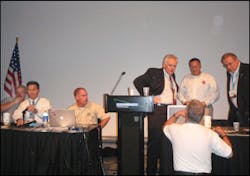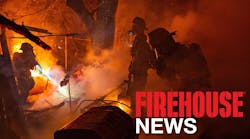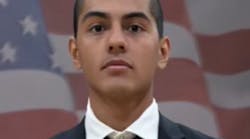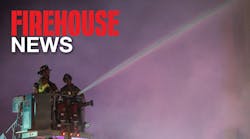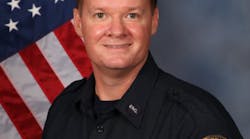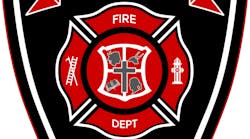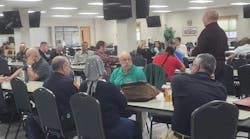What does it do to you when your life is immersed in the study of death.
What does it do to you when your life is immersed in the study of death?
Nine firefighters died in Charleston, S.C. in June 2007 in the Sofa Super Store blaze. Six firefighters were appointed to examine the fire, analyze the incident and explain why such a tragedy happened. But that is too simple of a description of the task.
"I understood this mission in theory before we became involved in the Charleston project, but it became very real and personal as we worked our way through it." J. Gordon Routley.
J. Gordon Routley, project leader, Mike Chiramonte, Brian Crawford, Pete Piringer, Kevin Roche and Tim Sendelbach were chosen for this assignment over a year ago by the Charleston Mayor Joe Riley. For some it was not an easy decision to accept the task. And some of these men were advised not to get involved with a process that focuses on such an emotional issue in an environment where comrades could be held responsible for others' deaths.
The job is not yet done. The six are still to create with the department a strategic, five- to ten-year operational plan. But because of their time and effort so far, two lengthy reports have been completed; Phase One Report, Oct. 16, 2007, an organizational analysis of the Charleston Fire Department. This review was conducted before undertaking the detailed analysis of the Sofa Super Store incident, so that the City and the Fire Department could begin the process of implementing the first set of recommendations, while the incident analysis is being conducted.
And the Phase Two Report, issued May 15, 2008,is a comprehensive analysis of the incident that examined a wide range of factors that could have contributed to the tragic loss of nine members of the Charleston Fire Department. The ultimate objective of this analysis was to identify the lessons that may be learned from this incident, with the goal of reducing the risk of future occurrences of a similar nature.
Those who had anything to do with the Charleston Fire Department prior to the tragic fire, saw in these reports, a scathing indictment of the leadership, operating procedures and culture of the department. The review team was blunt and to the point.
"It is very difficult to realize that nine firefighters, with whom we share a very strong and common bond, could lose their lives so tragically and under circumstances that could have and should have been avoided." J. Gordon Routley.
For this investigation team, immersed this long in the lives and deaths of these firefighters and this incident, could it and should it leave deep impressions on their personal and professional lives? It has.
"In reality, I can't tell you fully how much my life has changed, as a result of this experience -- no one will ever know how heavy it has been." Michael Chiramonte.
"As we studied the situation we learned many things human nature related to the tragic fire that occurred on June 18, 2007. We were exposed to much raw emotion, wonderment, denial, anger, sympathy and grief. We weren't just professional consultants we were firefighters, fathers, brothers, sons all of whom had a deep respect and care for the memory of the Charleston 9 - Mike Benke, Billy Hutchinson, Louis Mulkey, Brad Baity, Mark Kelsey, Mike French, Melvin Champaign, Earl Drayton and Brandon Thompson." Pete Piringer.
Consider that it was important to determine if and when the firefighters killed, or any firefighter gave out a distress call, a call for help or a mayday report anytime during the incident. That meant listening over and over to audio tapes of the radio traffic, for that single moment when they heard "In Jesus name, Amen", and perhaps 20 other pleas for help, or resignation to death. Seeking out those last words was an emotional trial.
"I appreciate more deeply how quickly things in our lives can change." Kevin Roche.
Consider the interviews of those who survived and who were in some way involved in the circumstances leading to the firefighter deaths. There were those who couldn't connect to a working fire hydrant fast enough, those who sent firefighters into the blaze, those who for a brief moment touched and lost confused firefighters in the midst of heat and smoke, those who ordered horizontal ventilation, those who totally lacked situational awareness and those who couldn't see the big picture. Such interviews are not easy conversations.
"I viewed this project as a huge responsibility. I realized that there was essential information that could only be captured and documented if we did our work very thoroughly, conscientiously and impartially. The information was critical to understand what happened at the scene of the fire, so that the lessons could be learned and shared with all firefighters." J. Gordon Routley.
Then there were the victims' families. The team presented the Phase Two report privately to the families before anyone else had a chance to see it. "There was nothing that could be done to bring the nine firefighters back, but we could honor them by determining and revealing the facts and using that information in a way that would save the lives of other firefighters. We also owed it to their families, loved ones and co-workers to explain what happened in terms they could understand, for their peace of mind." J. Gordon Routley.
Since the Phase Two Report was released, the team has taken the message around the country.
"Since the release of the report I have had countless opportunities to discuss various aspects of the findings with coworkers, the media, neighbors and total strangers, including many firefighters I have met, about our encounters while in Charleston. It is comforting to know that although this was a terrible tragedy that took a tremendous toll on a whole community, a state and the nation, there are people willing to open their minds trying to learn from this experience in hopes that a similar occurrence may never happen again." Pete Piringer.
At some of the biggest fire service conferences, Firehouse World, Firehouse Expo, Fire Rescue International, usually with Routley as spokesman, the presentation has been given to thousands of mesmerized attendees, glued to their chairs as photos and videos, fire ground radio traffic, maps and diagrams have described the pieces of the puzzle now known as the Charleston Sofa Super Store Fire.
"There was a professional and personal responsibility to get it right and communicate the information effectively and we developed a personal connection to nine firefighters we had never met personally, but got to know very well --- and the same type of connection to their families and to all of the firefighters who were involved in the incident." J. Gordon Routley.
Often those listening get choked up, and then are startled by the circumstances of the botched operation, and then amazed at the out of touch fire ground decision making. Always at the end of the presentation there is a standing ovation for the totality of the analysis by these six men.
"My participation in the Charleston report has shown me how important it is for all fire service members to keep looking around at the world outside of their own fire department and adopt/adapt/try new ideas that will help improve the safety of firefighters and the services that we provide to our customers. My involvement has also strengthened my respect for incident commanders and for the responsibilities that they have to the firefighters working for them." Kevin Roche.
"The fire that occurred on June 18, 2007 at the Sofa Super Store has had a significant effect on everyone with a vested interest in nine firefighters who died, including the Charleston fire department, the City of Charleston, the greater Charleston community and thousands of firefighters across the United States." Pete Piringer
"I have always been an advocate of firefighter safety and fire prevention. This incident did, however, intensify my passion for these vital fire service topics. As I have been traveling the country and receiving e-mails from various fire departments, I realized that the Charleston Fire Department was not that unusual as to their approach to firefighter safety and fire prevention. Most departments do not see the clear relationship between these two topics." Michael Chiramonte.
Anyone who has been exposed to the news accounts of the tragedy or has spent time studying the review team reports must experiences some emotional response. And that is certainly the case with the team members.
"My personal approach to life has been greatly changed. After seeing the effects that this tragedy has had on the families of the "Charleston Nine," I appreciate family much more than ever. It has intensified my passion for the unique brother and sisterhood that we have in the fire service. Being a member of the Charleston review team has given me four new friends that I deeply respect for their knowledge and professionalism, Gordon, Brian, Tim, Pete and Kevin, my fellow team members." Michael Chiramonte.
"The whole experience was totally consuming - personally, professionally and emotionally. This experience has also helped me to rededicate my focus towards health and safety both personally and professionally." Pete Piringer.
"We could feel the emotional impact on everyone involved, including ourselves. I have known for a long time that life is inevitably fatal, but this project really made me aware that lives can be lost very easily and through no fault of the victims themselves, if others fail to fulfill their responsibilities. We all have huge responsibilities to ensure that we are safe and others are safe ... and we have to depend on each other....and there are no guarantees. This is real life and real death. Making others aware has become one of my important personal responsibilities." J. Gordon Routley.
The team added a dedication within the Phase Two Report which sums up the underlying reason for taking on this task. "This report is dedicated to the nine Charleston firefighters that lost their lives on June 18, 2007, to their families and friends, to the surviving members of the Charleston Fire Department, and to the Charleston community. May the lessons learned from a truthful and complete analysis of this incident prevent future tragedies."
The six members on the Post Incident Assessment and Review Team team were:
J. Gordon Routley, retired chief of the Shreveport Fire Department in Louisiana. Chief Routley led the review team. He holds a civil engineering undergraduate degree and a master's degree in public administration, and currently serves as technical adviser for the Montreal Fire Department. He has extensive experience with fatal fire investigations.
Kevin Roche, an assistant fire marshal and assistant to the fire chief in Phoenix (AZ). He is considered an expert on firefighting equipment and research.
Tim Sendelbach, former chief of training for the city of Savannah (Ga.) Fire and Emergency Services. His role in the review was focused on training issues. He is past President of the International Society of Fire Services Instructors and currently serving as Editor-in-Chief for FireRescue Magazine and President of TES2 Training & Education Services in Savannah (GA).
Brian Crawford, is fire chief in Shreveport (La.) and a resident instructor at the National Fire Academy. Crawford, who holds a master's degree in industrial psychology, focused on the department's administration and operations.
Mike Chiramonte, a former fire chief in Lynbrook, N.Y. His expertise is in fire prevention and fire codes. He is a certified New York State Building and Fire Inspector and instructor at the National Fire Academy, instructing in fire prevention, communications and leadership.
Pete Piringer, public information officer for Montgomery County (MD) Fire and Rescue Service. He oversaw the review team's communications and public outreach efforts as well as advise the department on media relations and public information.
